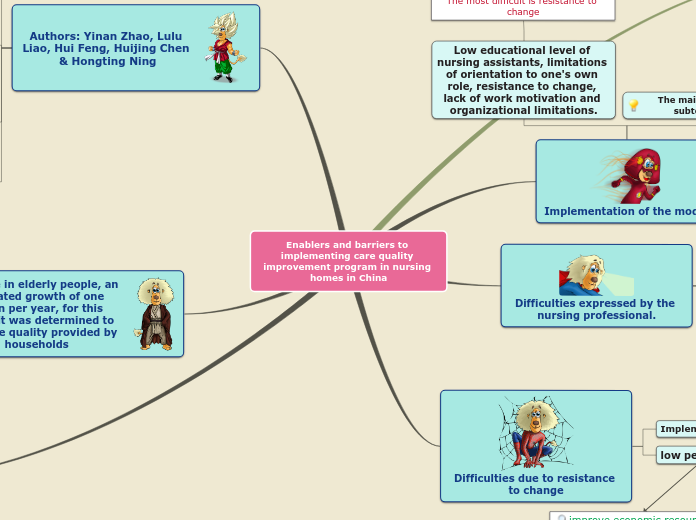Enablers and barriers to implementing care quality improvement program in nursing homes in China
Topic principal

Implementation of the model
Low educational level of nursing assistants, limitations of orientation to one's own role, resistance to change, lack of work motivation and organizational limitations.
The most difficult is resistance to change
The main barriers include the subtopics described as:

Difficulties expressed by the nursing professional.
low educational level of healthcare personnel
nursing assistants not trained to care
Disobedience by the assistants when they are older

Difficulties due to resistance to change
Implementation of new protocols
constant training of nursing professionals
Yard Champions Implementation
antiquity rules
limited organizational funding to support the project
low performance
improve economic resources
Improve physical resources
Improve human resource
Authors: Yinan Zhao, Lulu Liao, Hui Feng, Huijing Chen & Hongting Ning

Methodology
Qualitative descriptive research in eight nursing homes in four major cities
Changsha, Xiangtan, Zhuzhou and Yueyang.
Information is collected through interviews with nursing directors, group discussion with clinical nurses and nursing assistants.
Approved by the medical ethics committee of the China Clinical Trials Registry (No. ChiCTR-IOC-17013109, https://www.chictr.org.cn/index.aspx).
Data from 50 clinical nurses and 64 nursing assistants
All interviews were audio-recorded and later verbatim transcribed. Because of the language difference.
Objective
Implement the quality of care improvement program

Published on October 7, 2021
Subtopic
Increase in elderly people, an estimated growth of one million per year, for this reason it was determined to study the quality provided by households

Complications:
Lack of staff
Lack of attention skills
Inappropriate attitudes
Nursing staff misconduct
In australia birth of:
The Clinical Care Mentoring for the Elderly (ACCM)
What is it about:
Provide and encourage professional development in colleagues through communication, education and support

The ACCM model
Five strategies
training of geriatric care mentors
provision of available training resources
establishment of an internal communication mechanism
feedback
promoting the quality improvement process
unprofessional nursing
Most homes are run by nursing assistants or untrained staff.

Low economic remuneration and education is an impediment to improve the quality of service.
